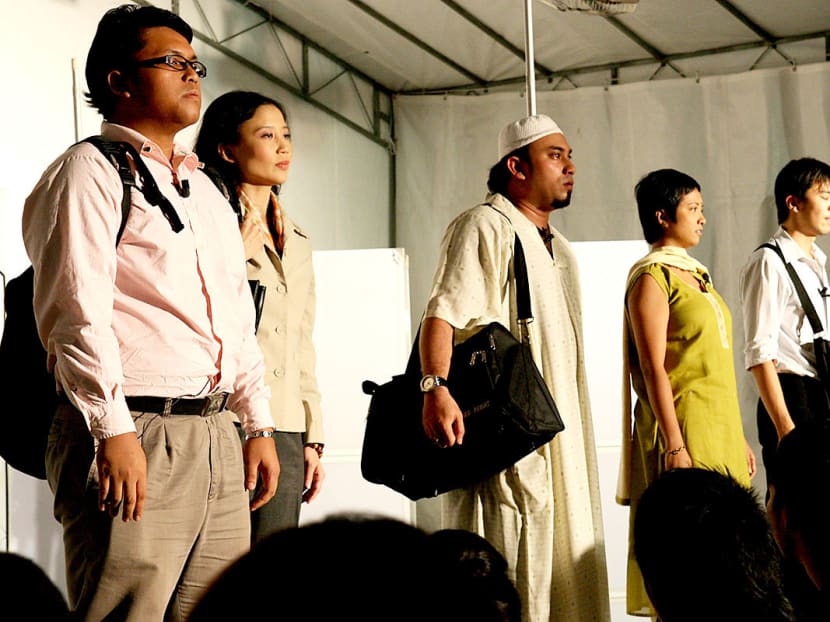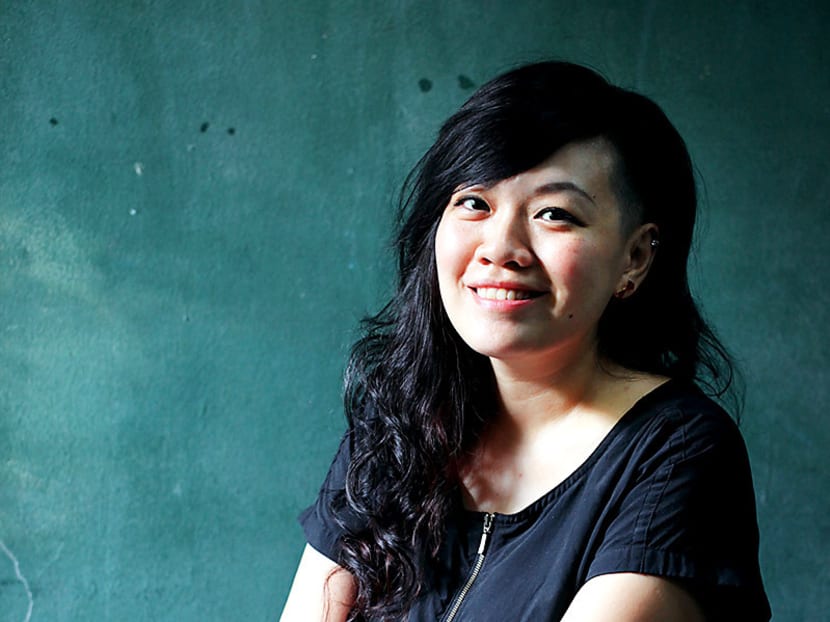The power of community
In conjunction with its 25th anniversary celebrations, contemporary theatre company Drama Box will be presenting a festival titled SCENES: FORUM THEATRE next month.


In conjunction with its 25th anniversary celebrations, contemporary theatre company Drama Box will be presenting a festival titled SCENES: FORUM THEATRE next month.
The festival is the official launch programme for GoLi - The Moving Theatre, the first inflatable travelling theatre in Singapore.
People from all walks of life can come together and share their views on various issues in 12 forum theatre plays.
We speak with Ms Koh Hui Ling, artistic director of SCENES: FORUM THEATRE and associate artistic director of Drama Box, on the evolution of forum theatre in Singapore.
What is the purpose of forum theatre?
It stems from the philosophy of Theatre of the Oppressed. It allows the oppressed to have a platform through theatre to vocalise their oppression, have constructive dialogues and take action to make changes in life and in the environment they are in.
Do you agree with its creator Augusto Boal that forum theatre can change the world?
It depends on how you define change - entire system overhauls overnight or small personal changes that would eventually snowball into a new community norm? I feel it can change the world, and it is with this hope that we continue using this form in our creations now in its 15th year. However, any behavioral/societal change takes sustained effort and time. It is counter-intuitive to the capitalistic system that we are very used to, where efficiency and output are the leading forces. I choose to be optimistic, and measure the small wins along the way. It is also important to note that forum theatre is only one of the techniques under the philosophy and arsenal of Theatre of the Oppressed, which is designed to aid participants through a sustained process, working towards change.
Drama Box has been doing forum theatre for many years. How do you think this art form has progressed in Singapore over the years?
It has definitely progressed. Our dramaturgical structure has modified from the way Boal first did it, and has also incorporated some philosophies from David Diamond (Theatre for Living, Canada), which sees the use of forum theatre in first-world nations. Having done it for 15 years, we have gotten quite a clear sense of what the optimal storytelling flow is. The storytelling structure can be modified to suit the language/society’s needs, but it should never deviate from the original intentions of what forum theatre was set out to do - speaking for the oppressed about oppression. It will be exciting to see how this form will evolve in the future.
Do you see an increase in audience numbers, participation and interest?
Definitely. We have more agencies and organisations contacting us with ready themes and projects now that they understand the form a little bit more. The audience has also become more vocal and generous with sharing their thoughts and opinions as compared to the time when we first started doing it in the community.
Are there any downsides to doing forum theatre in Singapore?
Having worked with beginning practitioners, I have observed that it is easy to focus on the interpersonal level and interactivity of forum theatre, and forget about the oppression or power relations at play in society. People also expect instant results at the end of a two-hour exchange. It is also common for people to mistake the forum theatre purely as a performance, but it actually encapsulates an entire workshop process in devising the piece, which finally becomes the output performance that meets the audience. When Boal first developed the form, the oppressed communities were the content providers and performers. In Singapore, we engage professional actors to perform the scripted piece. So, it is important to induct the actors into the issues by exposing them to the oppressed communities.
What is the most satisfying aspect of doing forum theatre?
Having audiences lingering around after the official showtime is over, hearing them share their personal take and stories inspired by the show they’ve just watched. It is another session of sharing thoughts, opinions, activation and application into reality. And having them tell us, when we meet again, what direct actions they had taken since we parted and that have changed their lives.
Any particularly memorable ones you can share with us?
In 2003, we were doing a piece about SARS in the community. We were having a very intense discussion about the support to be given by the community towards a quarantined person, and were stuck with what we could do. A young boy around eight raised his hand. Everyone was surprised to see a child, shivering from being on stage, put on the costume of the character (a shirt too big for him), and simply instruct the quarantined person to close the door and only to open it after he has left, and then proceed to leave the food outside his door. Sometimes, we adults complicate matters for ourselves.
How are themes selected for your forum theatre productions?
At Drama Box, our philosophy of social engagement is in call and response. Sometimes, we as practitioners living in the community (Singapore) can make a call out to the bigger society when we feel that it is a theme that is important to discuss, and see how the audience responds to it. Other times, the community (marginalised communities, NGOs, organisations), having seen our plays, invite us into their community and we create a piece based on that.
Are there any themes that are considered taboo?
As long as the form does not become a mouthpiece of the oppressor and is not a situation of aggression, there are no themes we find taboo. However, this may not be the case for performance licence application.
How much of a typical forum theatre production of Drama Box is scripted?
In a forum theatre performance, there are two parts: The anti-model (the preposition we put forth) and the interventions (the dialogue space opened for discussion and actions by the audience). The anti-model needs to be well-researched with the stakeholders of the issue being discussed, and this is the part that is scripted and rehearsed. We do rehearse possible interventions as well, but we can never underestimate the power of the community in proposing opinions and actions.
Is there a standard format that you adopt?
Yes. There is a strict dramaturgy format for the anti-model, and the performance flow. The audience will be eased into the theme of the play and will watch the anti-model. This is followed by discussion on the topic, and then interventions.
How are the actors trained to engage constructively with the audience?
I like to work with community actors, people who have a stake in the theme. They are better able to empathise and provide depth of the issues. Good professional actors with stake in the theme are heaven-sent.
What can the audience expect in your forum theatre production?
A high aesthetics show, with great content. The most important concerns of the community at that point in time, and learning from others in the community.
Were there any incidents where an audience member got out of hand?
Once, we did a piece about what home means. One audience member came on to intervene as the character, and after a few moments, got carried away to address his personal concerns to the audience. Of course, with our experience working in the community as jokers (facilitators), we handled the situation, but more amazingly, the audience disagreed in a calm manner and were able to share their disagreements clearly, allowing us to have a very constructive dialogue as a result. I am always amazed by our public. They know how to step in when someone gets out of hand. This is when the real dialogue happens, and we all learn from the experience.
Were there incidents where the audience was too passive and needed lots of cajoling?
Only when we first started out 15 years ago. The socio-political landscape was very different. People were generally more reserved and afraid to speak up. We have never planted pre-arranged actors in the crowd to get things moving.
Any tips for the participating audience?
Empathise with the characters on stage, and share your thoughts because you never know what you say or think can change the way another audience member sees the issue.
For more details on SCENES: FORUM THEATRE, visit www.dramabox.org/eng/productions-community-festival2015.html.
Produced by the Special Projects Team





